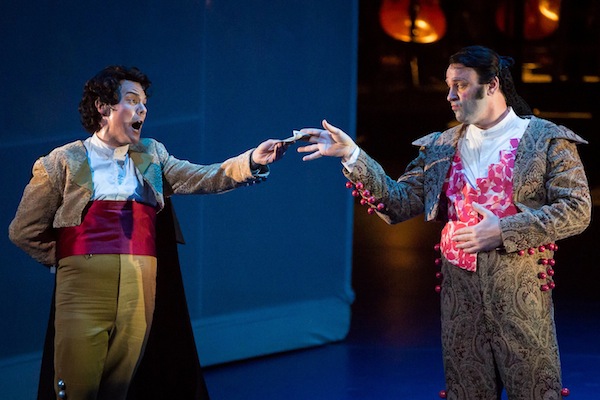Worthy cast vies with distractions in HGO’s overcaffeinated “Barber”

David Portillo and Lucas Meachem in Rossini’s “Barber of Seville” at Houston Grand Opera. Photo: Lynn Lane
As the antics of The Barber of Seville approach their climax, the hullabaloo around Dr. Bartolo’s home gets the best of his housemaid Berta. “There’s always confusion around here,” she complains. “A houseful of turmoil!”
Thet goes double in Houston Grand Opera’s staging of Rossini’s comedy classic. The production, which opened Friday in the HGO Resilience Theater, boasts a lively cast.
But unfortunately, that’s not enough for stage director Joan Font. He makes the opera’s principals compete with distracting, almost-constant byplay from townspeople, Dr. Bartolo’s servants and other onlookers. In HGO’s program booklet, the supernumeraries outnumber the cast.
Before the HGO Orchestra finishes the overture, a woman in a conical hat plants herself on a bench to one side of the stage and sets up candles and other paraphernalia. As Count Almaviva and Figaro–the love-struck nobleman and the jack-of-all-trades who smooths the way for his romance–introduce themselves in the first scene, a tippler and other passersby watch and react.
When the events move to Bartolo’s living room, Rosina–the object of the count’s affection and Bartolo’s–sings “Una voce poco fa” as servants putter around in the living room and outside the window. The bustle includes a manservant flirting with a maidservant. Rosina’s coloratura showpiece couldn’t hold the audience’s interest by itself?
You could ask the same question about the thunderous showcase number for Basilio, the conniving music teacher who tries to help Bartolo win over Rosina. As Basilio describes the glory of slander, Bartolo’s servants act out his words, with one servant representing the hapless victim and the others tugging him to and fro. Rossini’s music evokes Basilio’s strategy with much more punch.
As if the first-act finale didn’t include enough hijinks, servants haul in and hoist a massive chandelier, which carries one servant aloft with it. He swings there through the rest of the scene.
The singers, insofar as they could shine through all that, were a vivacious lot Friday in the opening performance.
Making his HGO debut, baritone Lucas Meachem cut an ebullient figure as Figaro, robust in voice and towering in stature. When Figaro’s famous entrance number, “Largo al factotum,” broke down the theatrical fourth wall, Meacham seized on the opening wholeheartedly, waving and blowing kisses to the audience. And he sang with equal swagger, complete with lusty high notes and a whirlwind of patter.
Tenor David Portillo relished Almaviva’s play-acting disguises: He hurtled around as the drunken soldier and took a breezy, terpsichorean turn as the fake music teacher Don Alonso. Portillo’s voice combined lightness and projection, and he savored the lyrical subtleties of his first aria, “Ecco ridente.” Coloratura flourishes were not his strong suit, however; some of them came across deftly, others not.
Mezzo-soprano Sofia Selowsky was a warm-voiced Rosina, bringing dash to the comic moments and lightness–more than electricity–to the vocal acrobatics. Her “Una voce poco fa” brought out allure and charm–both Rosina’s and the music’s–more than spitfire flamboyance.
Soprano Yelena Dyachek’s grace and poise made Berta’s little aria a treat. But it, like Basilio’s aria, faced competition from the servants (over)acting it out.
Some kind of medal should go to Peixen Chen and Eric Owens–playing Bartolo and Basilio, respectively–for freeing their roles from the huffing and puffing that often passes for basso buffo comedy. Both basses boasted hefty, resonant voices that let them treat Rossini’s music to salutary doses of real singing.
Owens unleashed a formidable crescendo to conjure up the storm Basilio’s aria invokes. And Chen–the bass soloist in HGO’s Verdi Requiem last season–brought Bartolo’s moments of befuddlement a stage whisper that was just as potent in its own way as the outbursts.
Designer Joan Guillén framed the sets with bars and locks that hinted at Rosina’s plight as a captive of her guardian and admirer Basilio. But it was done with a light touch, and Guillén’s costumes and props added a more whimsical note. Bartolo’s living room was dominated by a supersized piano painted pink.
The setup in the Resilience Theater, a temporary venue in Houston’s George R. Brown Convention Center, put the orchestra–led by conductor Emily Senturia–behind the stage. The sets, which sometimes moved into positions where they blocked the orchestra’s line of fire, were made of scrim, so they presumably stopped less sound than they might have.
But the orchestra nevertheless sounded muffed and distant, much as it did last week in the opening of HGO’s concurrent production of Richard Strauss’s Elektra. Even though the group apparently played crisply and briskly, Rossini’s score lost some of its sparkle. So, like Elektra, this Barber is the singers’ show. Or rather, it would be if the supernumeraries didn’t keep getting in the way.

